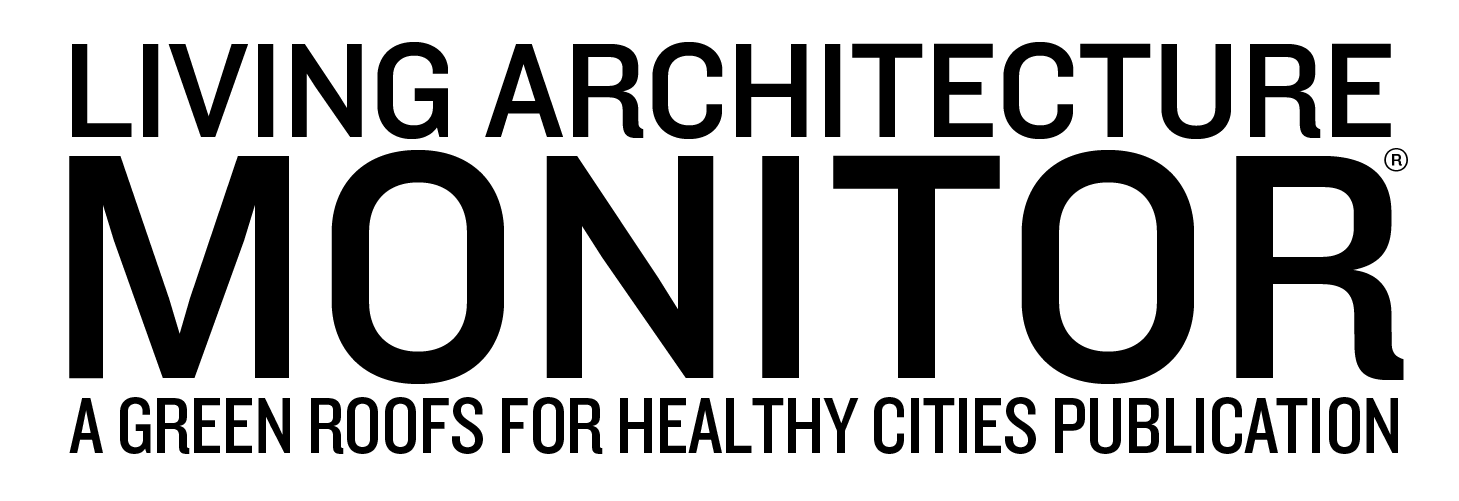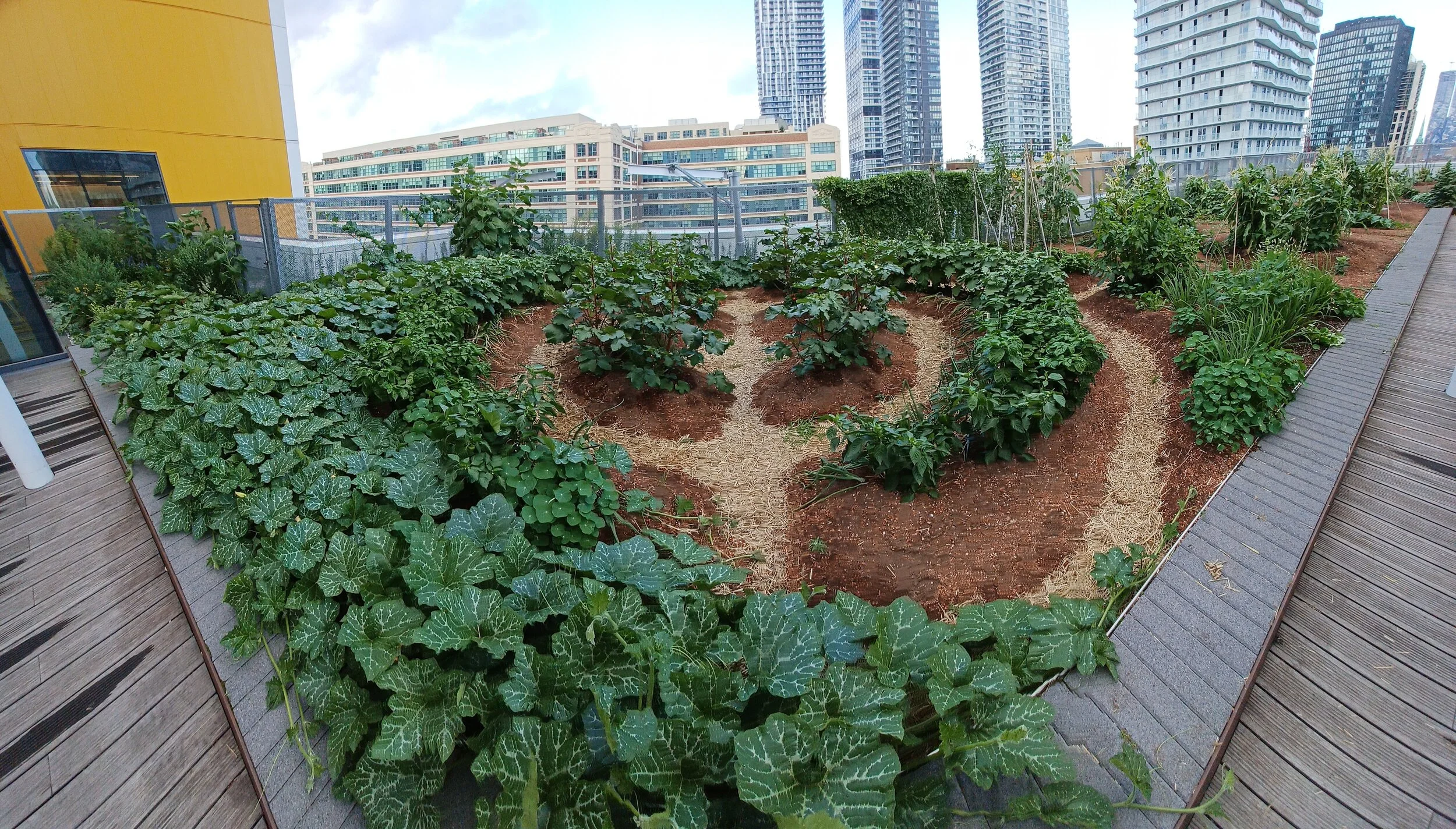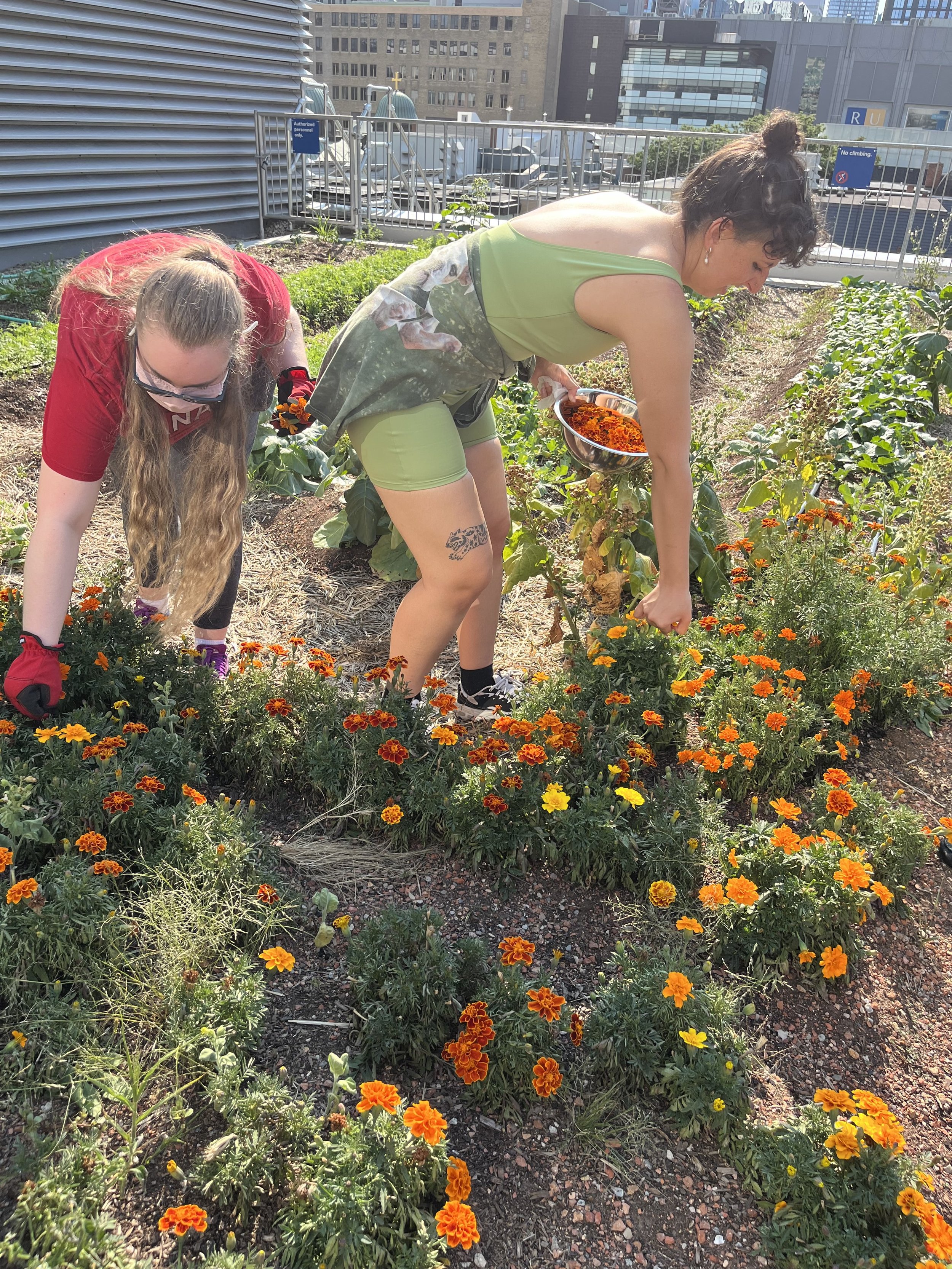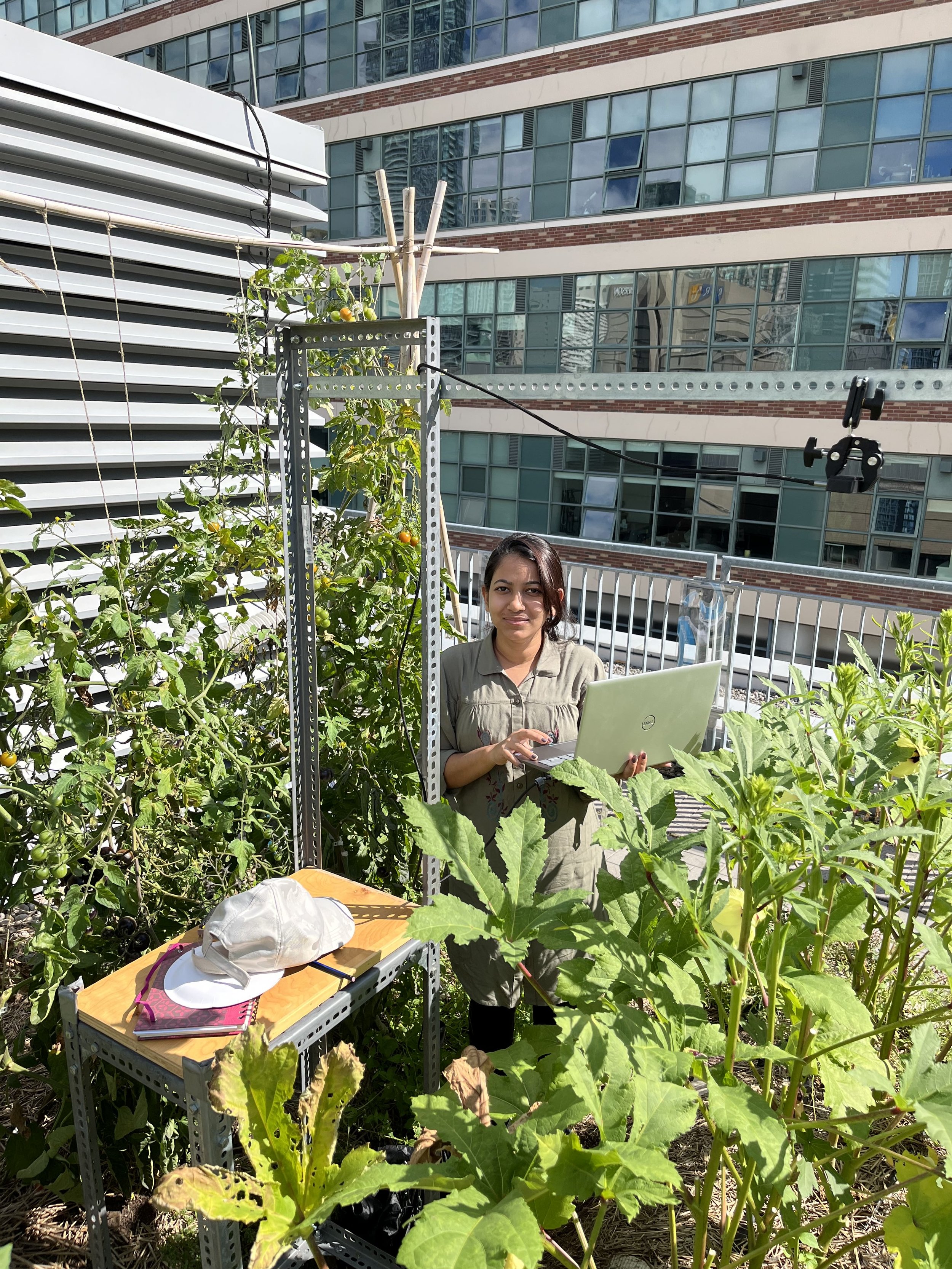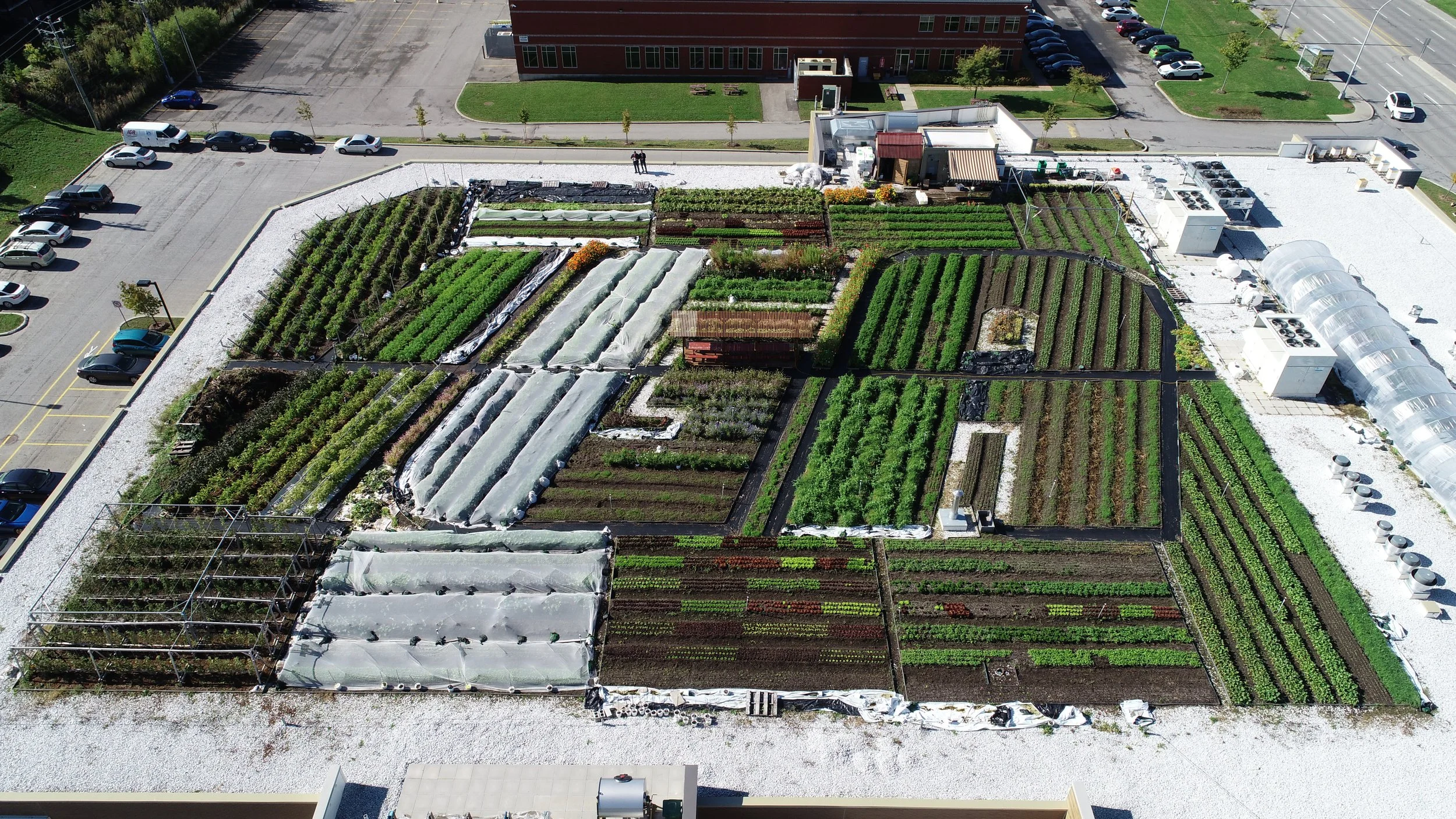Rooftop Farm Living Lab: Research Takes Root at the Urban Farm at TMU
Advertisement
The Urban Farm at Toronto Metropolitan University (TMU) operates two rooftop farms on campus to produce food, facilitate research and engage the community through ecological rooftop farming and food justice initiatives. With more than 80 rooftop crops in production, the Urban Farm harvests more than 3000 kg (6,631 lbs) of ecologically-grown produce each season, distributed to the community through sales and donations.
Urban Farm staff harvest the fields on the original rooftop location at the George Vari Engineering & Computing Centre. Photo: Urban Farm at TMU
Canada’s largest city is home to more than 800 green roofs, but there are only a handful of rooftops being used for food production in Toronto. The Urban Farm at TMU wants to grow that number significantly.
The Urban Farm’s first rooftop farm is a retrofit of an extensive green roof that was built in 2004 and planted with daylilies. It was converted to a rooftop farm a decade later, maintaining the original green roof assembly and growing media. This twenty-year-old green roof now boasts a quarter acre market garden along with dedicated plots for Indigenous Foodways, flower farming, mushroom cultivation, natural dyes and pollinator plants.
The Urban Farm’s second location is a purpose-built rooftop farm with a 5000 square foot green roof for Indigenous Foodways and Black Food Sovereignty, where culturally significant crops and medicines are grown using diverse growing methods. The rooftop includes indoor spaces for tool storage and post-harvest processing, a 400 square foot greenhouse and a gathering space for up to 140 people. This location officially opened in 2022 and is currently the only purpose-built green roof for food production under the City of Toronto’s Green Roof Bylaw, which requires green roofs on most new multi-unit residential, commercial and institutional buildings.
Advertisement
With a vision and mandate to see more productive green roofs in Toronto and beyond, the Urban Farm acts as a Living Lab, integrating interdisciplinary research collaborations into the daily operations of the farm. The Urban Farm aims to build resources for best practices in rooftop farming, addressing user-driven research needs that respond to the challenges of designing and operating a rooftop farm using green roof technology.
The newest rooftop farm on the Daphne Cockwell Health Sciences Complex is dedicated to Black and Indigenous food sovereignty initiatives. This is the Learning Circle gardens as part of the Black Food Sovereignty Initiative. Photo: Urban Farm at TMU
In 2019, the Urban Farm conducted a series of community consultations to identify research priorities for the Living Lab in partnership with the Centre for Studies in Food Security. With funding from Andrew and Valerie Pringle, more than 200 community stakeholders were consulted on the environmental, social and economic considerations for rooftop farming using green roof technology. Since then, the Urban Farm has hosted three annual roundtables to bring together urban farmers, academics, policy makers, developers and professionals across sectors to inspire and inform research in rooftop farming.
Applications for research partnerships are accepted at the start of each growing season and an advisory team reviews proposal submissions. The Urban Farm uses the Living Lab model because it promotes co-creation, innovation and user-participation, with the ultimate goal of developing effective solutions for improving rooftop farming that have been tested in a real-life setting. The Urban Farm actively participates in research collaborations and prioritises applications that are interdisciplinary, multisectoral and community-informed.
Advertisement
Fashion students harvest marigold flowers on the Urban Farm to use for natural dye projects as part of their curriculum. Photo: Urban Farm at TMU
Current and past research collaborations have covered a range of topics, including:
a natural dye experiential garden,
monitoring the rooftop using low-cost image sensors,
meteorological monitoring of the rooftop urban farm,
biochar as an amendment for engineered green roof soil blends,
water–energy–food nexus through enhanced green roof performance, and
environmental monitoring using commercial off-the-shelf IoT (Internet of Things) components.
A recent Living Lab study on the Hydrologic and Thermal Performance of a Full-Scale Farmed Blue-Green Roof, published on Academic Open Access Publishing at mdpi.com in May 2022, found that 85-88% of stormwater was retained by the Urban Farm’s green roof, resulting in a peak delay of 7.7 to 8 hours, greatly reducing strain on municipal infrastructure. The study was conducted by Tamer Almaaitah (MSc) and Dr. Darko Joksimovic (PhD) from August 2020 to December 2021 with the goal of comparing the ecosystem services of a rooftop farm, such as the ability to mitigate urban heat island and the potential to manage stormwater, to those of a green roof and a conventional roof. The study also found that maximum and moderate air-cooling effects were observed in the afternoon and evening, when cooling is most needed.
Photo caption: Living Lab research partners, Afsana Alam Akhie (PhD candidate Department of Civil Engineering TMU), monitors the hydrological performance of the rooftop farm and thermal performance of various crops. Photo: Urban Farm at TMU
While there are profound environmental, social and economic benefits to rooftop farming, designing and operating a rooftop farm requires a greater investment in comparison to a traditional green roof or even a ground level farm. For example, because rooftop farms are rich in organic matter and produce an abundance of biomass, they have a high potential to sequester carbon, reduce the urban heat island, divert stormwater, increase biodiversity and support native pollinators. These features play an important role in mitigating the effects of climate change, however the additional organic matter and drainage required will incur costs for the design-build, such as increased load capacity. Likewise, rooftop farms have meaningful social impacts, such as providing a biophilic environment for visitors, while supporting food justice by connecting people to their cultural foods, to nature and to each other. And while rooftop farming can strengthen the local economy by creating jobs and supporting the local food system, it requires extra operational expenses, particularly in human resources. Understanding the benefits and costs by quantifying ecosystem services, and developing tools and strategies to effectively design and operate rooftops, are some of the ways in which the Living Lab aims to support the growth of the rooftop farm industry.
In addition to research collaborations, the Urban Farm conducts ongoing farmer-led research by collecting data throughout day-to-day operations. This has allowed the Urban Farm to track metrics on phenology, insect activity and soil health, and to compile crop-specific information on yield and labour inputs. Through this data collection, the Urban Farm has developed standard operating procedures, crop planning tools, reference charts and rooftop soil amendment strategies, all available to the community through online resources, workshops and consultations. In 2020, the Urban Farm hosted two soil health panels online as part of a free series called Growing Better Rooftops. The panels brought green roof professionals, urban farmers and soil experts into discussion around strategies for optimising soil health in green roof media for food production. These are available to view on the Urban Farm’s website, along with other resources created through the Urban Farm’s Living Lab.
Research at the Urban Farm at TMU’s Living Lab
Are you interested in research related to rooftop farming? Explore research produced at the Urban Farm and learn more about the Living Lab’s online resources by visiting their website. If you have any questions about the Urban Farm, please reach out to urbanfarm@torontomu.ca. Listen to the latest podcast episode of Sustainable Futures on Food, Social Justice, and Community Healing featuring Arlene Throness.
Advertisement
Arlene Throness is passionate about growing, sharing and enjoying food. She is the Urban Farm Manager at Toronto Metropolitan University (TMU) where she oversees two campus rooftop farms. She holds a BA in Political Science from Concordia University and a certificate in Ecological Garden Design from Linnaea Farm on Cortes Island, BC. Prior to TMU, Arlene was the Coordinator of Concordia University’s Rooftop Greenhouse and a founder of its City Farm School. Arlene was a recipient of the Toronto Botanical Garden’s 2015 Aster Awards, given to individuals who embody the mission to transform our city by connecting people to plants and the natural world. Arlene has more than ten years experience growing food and an additional eight in landscaping, horticulture and silviculture.
